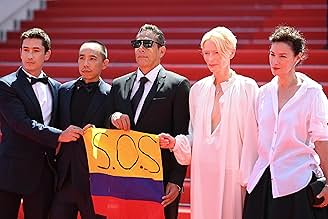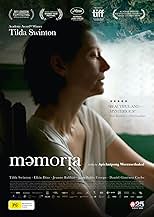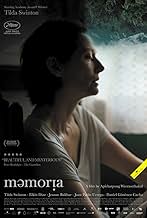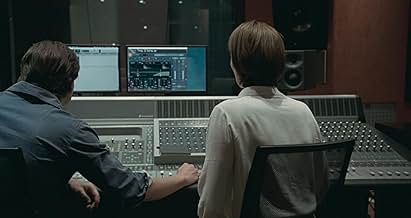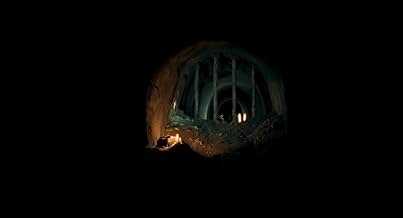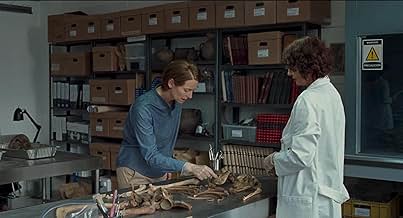CALIFICACIÓN DE IMDb
6.4/10
12 k
TU CALIFICACIÓN
Una mujer de Escocia, mientras viaja por Colombia, comienza a notar sonidos extraños. Pronto comienza a pensar en su apariencia.Una mujer de Escocia, mientras viaja por Colombia, comienza a notar sonidos extraños. Pronto comienza a pensar en su apariencia.Una mujer de Escocia, mientras viaja por Colombia, comienza a notar sonidos extraños. Pronto comienza a pensar en su apariencia.
- Dirección
- Guionista
- Elenco
- Premios
- 10 premios ganados y 27 nominaciones en total
Daniel Toro
- Anthropologist Assistant
- (sin créditos)
- Dirección
- Guionista
- Todo el elenco y el equipo
- Producción, taquilla y más en IMDbPro
Opiniones destacadas
This movie is very hard to watch and requires much patience. If you can connect with the movie, it will make it easier to watch. There are very long and still sequences. From the beginning to the end of the film, confusion prevails. We cant really understand what is happening. Nothing is clear. And the movie does not give us many answers. This is a "feel" movie. If you cant connect with the characters or the storyline it will be a disappointing experience for you.
To me this is the main issue with Memoria. For example, the IMDB question about spoilers is not even needed, there can be basically no spoilers when reviewing this film, since the "narrative" (can't really call it that) is fragmented and merely the pretext for the reflections the movie undertakes on several clever memory-related topics (notably the reality of recollection), from the simple perspective of the experiences concerning a single human individual, to the collective thoughts of a society as a whole. In that vein the characters and some movie conventions (the classical journey of the main character, although we are never sure what it exactly is) are used as a sort of vessels.
As long as that is accepted I found that most of my criticism (which would put me firmly on the side of "bad" reviewers) fell off the wayside, and I enjoyed this beautifully shot contemplative piece for what it was.
But why didn't I rate it higher? Frankly because I was underwhelmed with the meditation itself or the tropes enveloping it (as I saw them), finding some of them trite and even ridiculous. Meditation around different issues comes also from some sort of familiarity, and I was not convinced that the filmmaker was not merely a tourist in this universe, rather than someone with a particularly deep insight.
This sort of approach is, of course, totally acceptable, just not something I could relate to here, as I could in other films he has done. And thus issues such the length of the film (as well as some of the sequences) became a problem, which would not have been the case had I felt fully in sync with the piece.
As long as that is accepted I found that most of my criticism (which would put me firmly on the side of "bad" reviewers) fell off the wayside, and I enjoyed this beautifully shot contemplative piece for what it was.
But why didn't I rate it higher? Frankly because I was underwhelmed with the meditation itself or the tropes enveloping it (as I saw them), finding some of them trite and even ridiculous. Meditation around different issues comes also from some sort of familiarity, and I was not convinced that the filmmaker was not merely a tourist in this universe, rather than someone with a particularly deep insight.
This sort of approach is, of course, totally acceptable, just not something I could relate to here, as I could in other films he has done. And thus issues such the length of the film (as well as some of the sequences) became a problem, which would not have been the case had I felt fully in sync with the piece.
So, this film is artistic AF. It has all of what most people who enjoy film dont like ( including myself) but it is an spiritual retreat. So i would suggest that you get a nice wine, sit comfortable in front of a big screen with good sound and enjoy a very slow visual artistic film. That in general. I also recommend to watch it alone, i think it is a very private film, and you will enjoy better when you can fully inmerse.
The director challenges the viewer the whole first part of the film, but preparing you for the next. Needs to bring you heart rate very low, and you will feel how time stops at some point. You will forget about outside world in the second part. Its not a film to entertaind, its more like a trip to the jungle , find a shaman, try ayahuasca and come back to normal life. Seems surreal, makes you wonder... Personally i was not prepared properly to watch this film, but i enjoyed it because i am also a photographer so i was enjoying every static frame. There is craft on this film, technically stunning.
The director challenges the viewer the whole first part of the film, but preparing you for the next. Needs to bring you heart rate very low, and you will feel how time stops at some point. You will forget about outside world in the second part. Its not a film to entertaind, its more like a trip to the jungle , find a shaman, try ayahuasca and come back to normal life. Seems surreal, makes you wonder... Personally i was not prepared properly to watch this film, but i enjoyed it because i am also a photographer so i was enjoying every static frame. There is craft on this film, technically stunning.
A woman hears noises. The audience will hear the noises, too. The woman jumps when she hears the noises. So too might the audience. She wants to find out what the noises are. We're along for the ride, trying to understand her journey as best we can...
Memoria is a film that's very, very different. Mostly, it's unique in a good way, but it is a challenging watch and if you're like me, you might come out of it not knowing exactly what you just saw... but hopefully, you'll appreciate how it made you feel.
I read this was only ever going to be shown theatrically, and that it would never get a streaming release or be released on DVD/Bluray. I thought that sounded pretentious, but now after seeing the film, if they stick with that plan, I understand why. Memoria is a quiet and sometimes deathly still film. I don't know if most people (myself included) would be able to concentrate on it completely if they were at home, and had mobile phones and the like as distractions.
This becomes clearest in the second half, which warps and seemingly deconstructs time itself as you're watching it. I know how pretentious that sounds. But approximately the last half is one long sequence that is slow in a way that's kind of awe-inspiring. And I can only estimate that this concluding chunk of the film was one half of it. It may have been more like 70 minutes. It could've been as short as half an hour.
With no clear narrative or structure, you're left no choice but focus intently in on what is (or isn't?) happening. It ends up being hypnotic. Some people were audibly relieved when it was over. I'd be lying if I said I was riveted the whole time, but I was too impressed with how Memoria as a whole felt to watch unfold to say it came anywhere close to being a waste of time.
Tilda Swindon deserves praise, too. I think the film asks a lot of her, and asks her to do it all subtly, too. She gives a great performance, and one that I don't think many others could do. Overall, this is a very slow and perplexing film, but I can't call it boring, and because of the unique experience it provided, I wouldn't call it frustrating or pretentious, either. It's absolutely worth 137 minutes of your attention, as long as you're mostly onboard with seeing something out there, and one that seeks to give you a unique film-watching experience more than it gives you a traditional narrative, or any easy answers.
Memoria is a film that's very, very different. Mostly, it's unique in a good way, but it is a challenging watch and if you're like me, you might come out of it not knowing exactly what you just saw... but hopefully, you'll appreciate how it made you feel.
I read this was only ever going to be shown theatrically, and that it would never get a streaming release or be released on DVD/Bluray. I thought that sounded pretentious, but now after seeing the film, if they stick with that plan, I understand why. Memoria is a quiet and sometimes deathly still film. I don't know if most people (myself included) would be able to concentrate on it completely if they were at home, and had mobile phones and the like as distractions.
This becomes clearest in the second half, which warps and seemingly deconstructs time itself as you're watching it. I know how pretentious that sounds. But approximately the last half is one long sequence that is slow in a way that's kind of awe-inspiring. And I can only estimate that this concluding chunk of the film was one half of it. It may have been more like 70 minutes. It could've been as short as half an hour.
With no clear narrative or structure, you're left no choice but focus intently in on what is (or isn't?) happening. It ends up being hypnotic. Some people were audibly relieved when it was over. I'd be lying if I said I was riveted the whole time, but I was too impressed with how Memoria as a whole felt to watch unfold to say it came anywhere close to being a waste of time.
Tilda Swindon deserves praise, too. I think the film asks a lot of her, and asks her to do it all subtly, too. She gives a great performance, and one that I don't think many others could do. Overall, this is a very slow and perplexing film, but I can't call it boring, and because of the unique experience it provided, I wouldn't call it frustrating or pretentious, either. It's absolutely worth 137 minutes of your attention, as long as you're mostly onboard with seeing something out there, and one that seeks to give you a unique film-watching experience more than it gives you a traditional narrative, or any easy answers.
*Watched at Cannes 2021 World Premiere*
The work of Thai director Apichatpong Weerasethakul (try saying that five times fast) have never fully been able to register with audiences outside of the festival circuit. He has amassed universal critical acclaim since he graced the Cannes Riviera in 2004 with "Tropical Malady." He creates gaps between his feature films by creating several short films, some of which eventually are spawned into feature-length, such as the 2009 short "A Letter to Uncle Boonmee" becoming the 2010 Palme d'Or winning "Uncle Boonmee Who Can Recall His Past Lives." Now in 2021, Weerasethakul is stepping outside of his native Thailand for "Memoria," (translated from the Latin word "memory") which prompted another return to Cannes, this time netting him the Jury Prize.
The first English-language film for Weerasethakul, "Memoria'' is set within Colombia, following Tilda Swinton from destination to destination. The film opens with a surprising jumpscare illustrating our main character's problem, which is that she often hears a loud crashing noise that seems to be confined entirely within her head. This noise confounds her, leading to an investigation into what exactly it is and why it is happening, which puts her in contact with a sound engineering student, a morgue doctor, and a strange fisherman offering profound insights on memory and identity.
Those familiar with the work of Weerasethakul will know that the plot is not the driving force behind the ultimate narrative. Instead, the visuals and sound work do the bulk of the heavy lifting. Within "Memoria," dialogue is seldom found for long stretches at a time, leaving the viewer to look at the screen like one would look at a painting, soaking in as much information as possible. This restriction of information will irritate those looking for answers to the questions the film raises, which Weerasethakul doesn't have any intention of addressing. The Cannes World Premiere garnered nearly fifty walkouts from disgruntled viewers, and several nodding heads from the slow pacing that were often reawakened by the mysterious crashing noise, which shook the theatre.
Swinton acts less like a character and more like a wandering observer. Never shot in closeup and always present of the world around her, she moves from place to place, learning new information about her condition, all without much dialogue from her end. The first half of the film is where Swinton does most of her traveling, which keeps the film moving at a steady, yet still slow, pace. Much of the "action" within these journeys would be considered filler in most mainstream projects, such as Swinton waiting patiently for the sound engineer to finish his work before addressing her, or an unbroken take consisting solely of car alarms going off.
The last hour of the film is where some will applaud and others will boo (just as they did at the world premiere). Swinton's final journey takes her to a remote village housing a fisherman who claims to remember everything about his life. The two of them engage in an extended conversation that explores the strange connection they share. To an extent, the conversation acts as a vessel for Weerasethakul to talk to his audience about his ideas about cinema and life. It's a bold move by a director not known for boldness, and is one that teeters reshapes the way you look at the world at its best and teeters on self-aggrandizing at its worst. Weerasethakul ties his thesis up in a perfect bow with an ultimate answer that is fittingly incomprehensible and produces several more questions.
"Memoria" is a work for the cinephiles that need an escape from the noise of the modern world. It's wildly beautiful and imaginative, all while challenging your patience and viewpoints. Go in with an open mind, and you find yourself enlightened.
The work of Thai director Apichatpong Weerasethakul (try saying that five times fast) have never fully been able to register with audiences outside of the festival circuit. He has amassed universal critical acclaim since he graced the Cannes Riviera in 2004 with "Tropical Malady." He creates gaps between his feature films by creating several short films, some of which eventually are spawned into feature-length, such as the 2009 short "A Letter to Uncle Boonmee" becoming the 2010 Palme d'Or winning "Uncle Boonmee Who Can Recall His Past Lives." Now in 2021, Weerasethakul is stepping outside of his native Thailand for "Memoria," (translated from the Latin word "memory") which prompted another return to Cannes, this time netting him the Jury Prize.
The first English-language film for Weerasethakul, "Memoria'' is set within Colombia, following Tilda Swinton from destination to destination. The film opens with a surprising jumpscare illustrating our main character's problem, which is that she often hears a loud crashing noise that seems to be confined entirely within her head. This noise confounds her, leading to an investigation into what exactly it is and why it is happening, which puts her in contact with a sound engineering student, a morgue doctor, and a strange fisherman offering profound insights on memory and identity.
Those familiar with the work of Weerasethakul will know that the plot is not the driving force behind the ultimate narrative. Instead, the visuals and sound work do the bulk of the heavy lifting. Within "Memoria," dialogue is seldom found for long stretches at a time, leaving the viewer to look at the screen like one would look at a painting, soaking in as much information as possible. This restriction of information will irritate those looking for answers to the questions the film raises, which Weerasethakul doesn't have any intention of addressing. The Cannes World Premiere garnered nearly fifty walkouts from disgruntled viewers, and several nodding heads from the slow pacing that were often reawakened by the mysterious crashing noise, which shook the theatre.
Swinton acts less like a character and more like a wandering observer. Never shot in closeup and always present of the world around her, she moves from place to place, learning new information about her condition, all without much dialogue from her end. The first half of the film is where Swinton does most of her traveling, which keeps the film moving at a steady, yet still slow, pace. Much of the "action" within these journeys would be considered filler in most mainstream projects, such as Swinton waiting patiently for the sound engineer to finish his work before addressing her, or an unbroken take consisting solely of car alarms going off.
The last hour of the film is where some will applaud and others will boo (just as they did at the world premiere). Swinton's final journey takes her to a remote village housing a fisherman who claims to remember everything about his life. The two of them engage in an extended conversation that explores the strange connection they share. To an extent, the conversation acts as a vessel for Weerasethakul to talk to his audience about his ideas about cinema and life. It's a bold move by a director not known for boldness, and is one that teeters reshapes the way you look at the world at its best and teeters on self-aggrandizing at its worst. Weerasethakul ties his thesis up in a perfect bow with an ultimate answer that is fittingly incomprehensible and produces several more questions.
"Memoria" is a work for the cinephiles that need an escape from the noise of the modern world. It's wildly beautiful and imaginative, all while challenging your patience and viewpoints. Go in with an open mind, and you find yourself enlightened.
¿Sabías que…?
- TriviaIn an unconventional move, art-house film distributor Neon is releasing Memoria in the USA "from city to city, theater to theater, week by week, playing in front of only one solitary audience at any given time." And furthermore, according to IndieWire (10/5/21) the film will only play in theaters and it will not become available on DVD, on demand, or on streaming platforms. They later abandoned this release strategy though after touring through only New York and Chicago and the film was eventually released in many cities simultaneously across North America in April, 2022.
- Citas
Older Hernán Bedoya: I remember everything, so I limit what I see.
- ConexionesReferenced in Radio Dolin: Stream with Anton Dolin (2021)
- Bandas sonorasMemoria
Written by César López
Piano performed by César López
Cello performed by Sandra Parra
Recorded by Julio Monroy
Recorded in Bogotá, Columbia by Burning
(C) 2020 Burning
Selecciones populares
Inicia sesión para calificar y agrega a la lista de videos para obtener recomendaciones personalizadas
- How long is Memoria?Con tecnología de Alexa
Detalles
Taquilla
- Total en EE. UU. y Canadá
- USD 52,656
- Fin de semana de estreno en EE. UU. y Canadá
- USD 6,797
- 26 dic 2021
- Total a nivel mundial
- USD 588,713
- Tiempo de ejecución2 horas 16 minutos
- Color
- Mezcla de sonido
- Relación de aspecto
- 1.85 : 1
Contribuir a esta página
Sugiere una edición o agrega el contenido que falta




